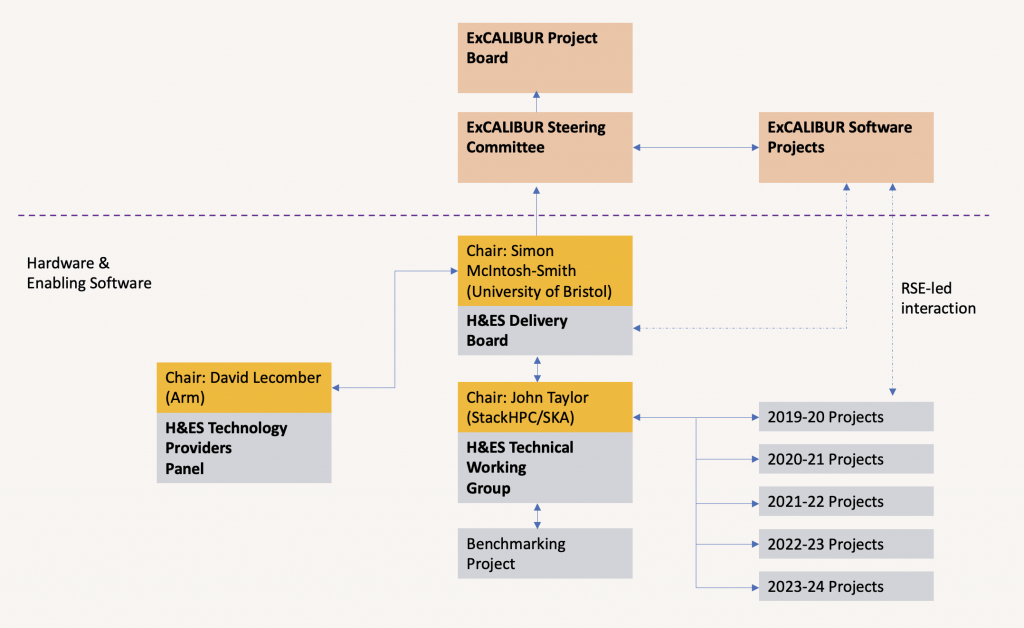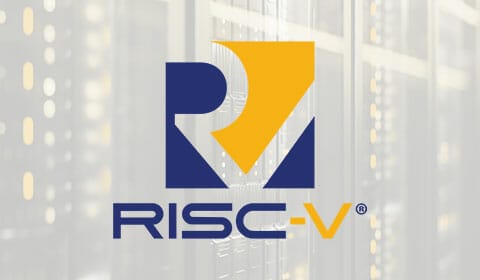About H&ES
The Hardware and Enabling Software Programme (H&ES) provides grant funding for testbed projects that give UK researchers early access to novel hardware and software technologies that may play a part in future exascale systems and services. H&ES testbeds are generally small-scale systems that are provided on an experimental basis, and clearly delineated from formal service provision to avoid interference with production workloads. Researchers can use the testbeds to validate the portability and performance of their codes, and to explore the potential of new paradigms such as workflow offload to data processing units or wafer scale compute engines.
Rationale
- Designed to inform, and be informed by, the ExCALIBUR software projects across the whole remit (UKRI, Met Office and UKAEA)
- Deliver proof of concept systems with future hardware relevant for the exascale computing needs of the UKRI research community
- Must interact with Public Sector, Industry and Commerce as real partners
- The exascale definitions we will use are activity based:
- Solving Problems that are a 10-1000x larger than we solve at present
- Solving Problems 10-1000x faster than at present
- Problems can be simulation, data modelling and/or data driven
- Can come from all areas of Research and Innovation
- Exascale “Velocity” is just an important output as exascale “Volume”
Funding
- ExCALIBUR was awarded £4.5M in capital funding over 4.5 years to develop a hardware fore-sighting programme
- Industry co-funding for the programme will be sought where possible
- The £4.5m capital will support novel hardware/software testbeds for prototyping and development, e.g. using pre-commercial equipment. This will:
- enable the software community to be ready to use commercial products effectively as soon as they come on to the market;
- provide the UKRI community with the ability to influence the technology industry and the necessary knowledge to guide their purchase decisions
- A core activity for H&ES is Benchmarking for Exascale
- H&ES will also be encouraging true Co-design activities
ExCALIBUR H&ES Governance
Oversight of the ExCALIBUR H&ES programme
ExCALIBUR H&ES governance model

Delivery Board (DB)
The H&ES Delivery Board provides oversight and governance for the programme as a whole. This group is comprised of compute and data intensive researchers and representatives of key organisations in the UK research sector, and chaired by joint H&ES project lead Prof Simon McIntosh-Smith (University of Bristol). Smith also sits on the ExCALIBUR Steering Committee and will act as key point of contact between H&ES and the wider ExCALIBUR initiative.
DB terms of reference
- Role – Provide oversight of the H&ES programme’s strategic direction and delivery.
- DB activities
- Help to raise awareness of the ExCALIBUR initiative and H&ES testbed projects within the various UK research communities, ensuring that ExCALIBUR reflects a diverse range of participants and research domains.
- Help to promote opportunities to engage with ExCALIBUR, the H&ES programme (such as funding calls) and H&ES supported testbed projects.
- Help to ensure skills and knowledge transfer occur through dissemination of H&ES programme and project level outputs such as resources, workshops and training.
- Receive reports from the H&ES Technical Working Group (TWG), tracking progress of testbed projects and recommending follow up action where appropriate.
- Receive reports from the H&ES Technology Providers Panel (TPP), ensuring that H&ES is engaging at an appropriately strategic level with technology partners.
- Feed forward potential requirements from UKRI supported simulation, experiments and resource providers in support of ExCALIBUR software and infrastructure design activities.
- Advise the H&ES programme team on novel hardware and enabling software technology areas that might benefit from investment, as potential themes for future H&ES calls.
- Advise the H&ES programme team and UKRI colleagues on potential future UK Exascale Pathfinder activities.
- Meet 3-4 times a year, with the aim of having one of these be a face-to-face meeting subject to feasibility.
- Report upwards on progress of the H&ES programme to the ExCALIBUR Steering Committee via the Chair.
Technical Working Group (TWG)
TWG membership
- Chair of the TWG – John Taylor (StackHPC/SKA)
- TWG project manager – Andrew Attwood (Hartree Centre – STFC)
- ExCALIBUR H&ES joint project leads – Prof Simon McIntosh-Smith (University of Bristol) and Revd Dr Jeremy Yates (UCL)
- ExCALIBUR H&ES project manager – Martin Hamilton (UCL)
- Representatives of each testbed project supported by H&ES
TWG terms of reference
- Role – to ensure the successful delivery of technology testbeds to support ExCALIBUR’s Exascale Software Development Programme.
- TWG activities
- Monitor the delivery and use of the individual technology testbeds on a monthly basis, reporting progress and issues to the delivery board.
- Provide guidance and support to the testbed delivery teams.
- Conduct horizon scanning to identify technology that should be considered for evaluation as part of the technology clusters.
- Engage with the Technology Providers Panel (TPP) to ensure requirements transfer and “State of the Art” technology feed in.
- Support benchmarking teams by providing system insight and also gaining system feedback.
- Manage e-infrastructure integration activities identified by the ExCALIBUR H&ES board.
- Provide input to the “extrapolation to exascale” exercises.
- Coordinate Technical training webinars and insight sessions relating to testbeds or resources provided by technology partners.
- Provide technical input to funding calls.
- Interact with International fellow travellers on road to exascale.
- Co-author project progress reports, white papers, technical reports or journal/conference papers.
- Meetings – the TWG will meet formally once a month, these meetings will be used to track testbed progress and form the basis of regular reports to the H&ES board. It is expected that ad hoc meetings will be carried out to discuss and resolve testbed issues.
- Reporting
- Prepare an annual report for the H&ES Delivery Board to be presented by the Chair of the TWG.
- Record minutes of meetings, including technology testbed progress.
Technology Providers Panel (TPP)
TPP membership
- Chair of the TPP – David Lecomber (Arm)
- H&ES joint project leads – Prof Simon McIntosh-Smith (University of Bristol) and Revd Dr Jeremy Yates (UCL)
- H&ES project manager – Martin Hamilton (UCL)
- Representatives of technology providers working with the programme – see graphic for logos of participating organisations

TPP terms of reference
A Technology Providers Panel (TPP) will be formed to allow the H&ES Programme to interact and collaborate with Technology Providers in a strategic manner to increase the efficacy and efficiency of our projects. This will be carried out with mainly bilateral interactions between the H&ES Programme and individual Technology Providers.
The TPP will be asked, whether individually or collectively, to provide advice to the H&ES Programme and where appropriate review materials for the Programme.
A Chair will be appointed by the Chair of the Delivery Board. The TPP Chair will work with the Project Directors and the DB Project Manager to produce ToRs and an early programme of activities.
Initially the DB Project Manager and the Project Directors will manage this, but we hope a dedicated position will be set up to manage these relationships and co-ordinate the activities of the TPP. Currently, the role of the TPP is defined as below. TPP members will be expected to: –
- Design and participate in H&ES Projects and this participation in, and the interaction with, the H&ES Projects will be the main way in which knowledge exchange and impact will be generated.
- This participation can be in the form of co-design of software, middleware and/or hardware; the benchmarking of software, middleware and/or hardware; designing and/or providing training in the use of software, middleware and/or hardware.
- Attend briefings, workshops and networking events organised by the H&ES Project
- Co-author project progress reports, white papers, technical reports or journal/conference papers
- Contribute hardware, middleware, software via loans, donations or discounting to the H&ES Projects
- The TPP shall prepare an annual report for the H&ES Delivery Board and this will be presented by the Chair of the TPP. This report will contain a report on the above activities.
A key requirement will be to produce an accepted methodology and process that enables the H&ES Programme members to share NDA information with other H&ES Programme members with the permission and knowledge of the involved Technology Provider Panel member or members.
H&ES Calls
H&ES Open Calls
As part of the ExCALIBUR initiative, UKRI are investing £4.5m over four years to create and evaluate novel pre-Exascale Hardware and Enabling Software (H&ES) testbeds, in a co-design collaboration with technology partners and the UK research community. Testbeds can include hardware and/or enabling software such as data subsystems, filesystems, compilers and debuggers.
There are no calls open at present for the H&ES programme.



